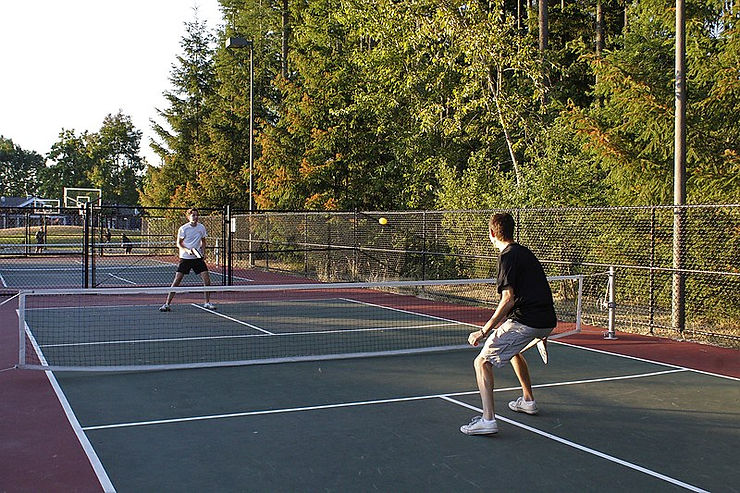By: Haven Bombay Oravec
Pickleball, a paddle sport that combines elements of tennis, badminton, and table tennis, has been gaining immense popularity in recent years. As the sport continues to grow, so does its impact on noise pollution. The noise generated by pickleball games has become a subject of concern, leading to its discussion at the 2023 Noise-Con, an annual convention dedicated to addressing noise-related issues. This article explores the rise of pickleball and its unintended consequence of noise pollution, highlighting the need for solutions to mitigate this growing problem.
Pickleball’s origins can be traced back to the mid-1960s when it was invented by three friends in Washington state, USA.( Pickle-ball USA). Since then, it has spread across the country and internationally, attracting players of all ages. The sport’s appeal lies in its accessibility, combining elements of popular racquet sports while offering a lower physical impact. Pickleball can be played on various surfaces, including outdoor courts, indoor gyms, and even driveways, contributing to its widespread adoption.
As pickleball gains popularity, so does its impact on the surrounding environment. The game involves hitting a perforated plastic ball with paddles, resulting in a distinctive “popping” sound. Bob Unetich, who started a consulting firm called Pickleball Sound Mitigation explained that hitting the pickleball with the paddle “creates vibrations in a range that can be extremely annoying to humans.” While this noise may not be a problem when played in designated areas, the issue arises when courts are located near residential neighborhoods or noise-sensitive areas.
Communities around the world have reported complaints about noise pollution caused by pickleball games. For example, the New York Times quoted many people with these concerns, “It’s like having a pistol range in= your backyard,” said John Mancini, 82, whose Wellesley, Mass., home abuts a cluster of public courts. “It’s a torture technique,” said Clint Ellis, 37, who lives across the street from a private club in York, Maine.“Living here is hell,” said Debbie Nagle, 67, whose gated community in Scottsdale, Ariz., installed courts a few years ago.
The continuous sound of balls being struck, coupled with players’ enthusiastic cheers and chatter, can disturb the peace and tranquility of neighborhoods. The rapid growth of pickleball’s popularity exacerbates this problem, as more and more players gather to participate in the sport, creating an increased level of noise.
The 2023 Noise-Con, an important annual event dedicated to noise control, has recognized the need to address the pickleball noise issue. Noise experts, researchers, and policymakers from various fields have come together to discuss potential solutions. The conference provides a platform for exchanging ideas, sharing research findings, and exploring innovative approaches to mitigate the noise pollution caused by pickleball. Solutions presented by experts including Bob Unetich include:
1) Noise Barriers: Implementing noise barriers around pickleball courts can help contain the noise within the playing area. Soundproofing materials and structures can minimize sound transmission and prevent it from affecting nearby residents.
2) Regulation and Awareness: Communities can establish regulations regarding court locations, operating hours, and noise limits. Local authorities can collaborate with pickleball associations to educate players and raise awareness about noise pollution and its impact on residents.
3) Soundproofing Technology: Advancements in soundproofing technology can offer promising solutions to reduce noise pollution. Researchers and manufacturers can collaborate to develop specialized noise-canceling equipment, innovative court designs, or paddle modifications that minimize noise without compromising the integrity of the game.
While pickleball’s popularity continues to soar, the issue of noise pollution associated with the sport must be addressed. The importance of striking a balance between promoting physical activity and preserving the tranquility of residential areas needs to be emphasized. By implementing noise reduction strategies, raising awareness, and fostering collaboration between communities, pickleball enthusiasts, and relevant authorities, we can ensure that the sport’s growth does not come at the cost of noise pollution. Through proactive measures, pickleball can continue to thrive as a beloved sport while maintaining harmony within communities.











